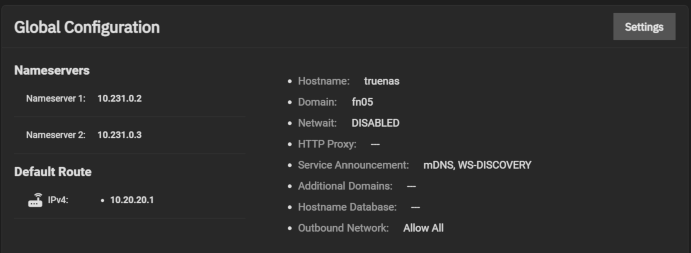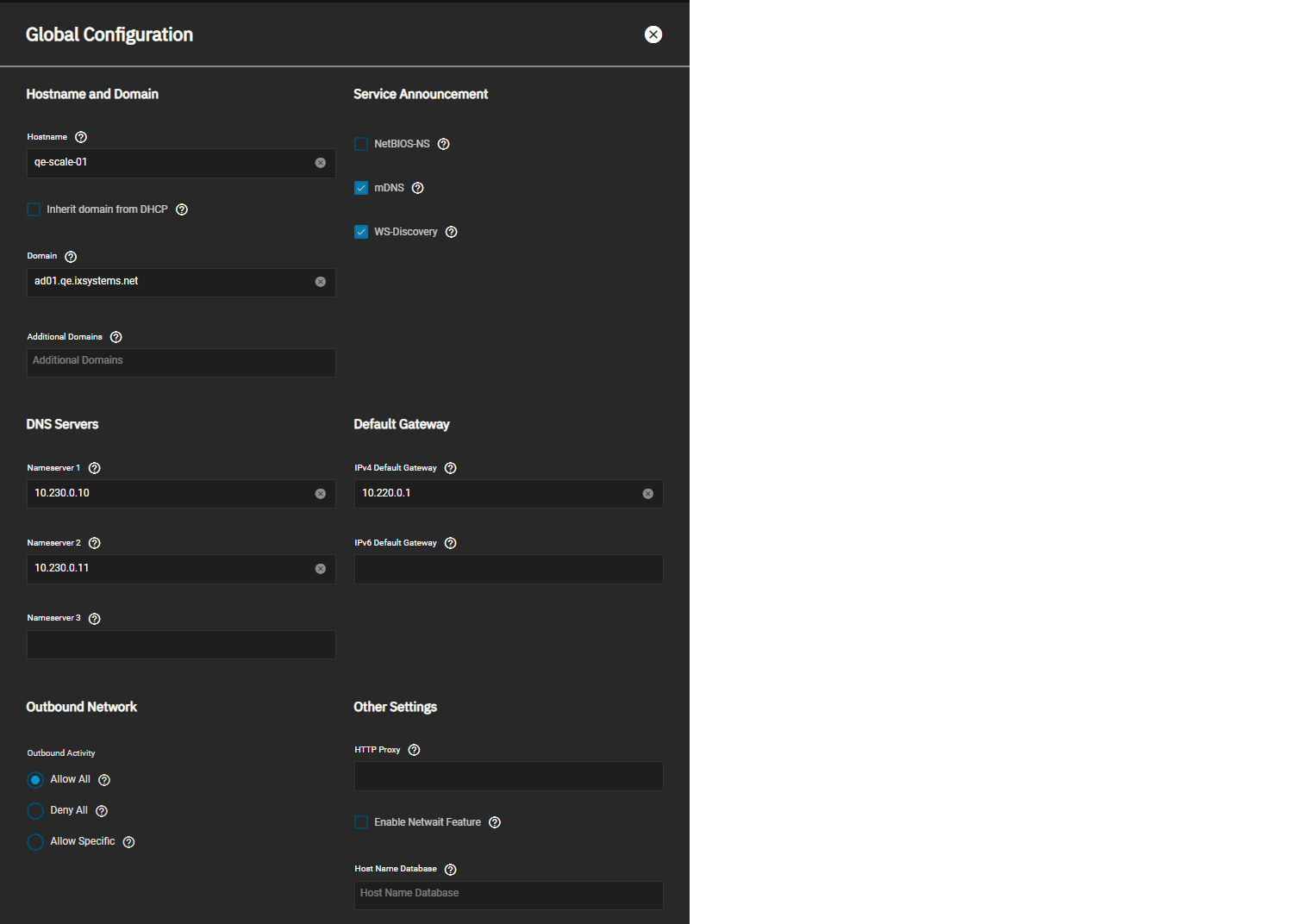Global Configuration Screens
4 minute read.
Last Modified 2022-12-02 15:43 -0500{{ toc }}
The Global Configuration widget displays the general TrueNAS networking settings not specific to any interface.
The SCALE information dislplayed the Global Configuration widget is the equivalent of the information displayed on the TrueNAS CORE Network Summary screen. Global Configuration settings configuration screens are similar in both SCALE and CORE but SCALE includes external communication settings.

Use Settings to display the Global Configuration screen where you can add or change global network settings.
Disruptive Change
You can lose your TrueNAS connection if you change the network interface that the web interface uses!
You might need command line knowledge or physical access to the TrueNAS system to fix misconfigured network settings.

Many of these fields have default values, but users can change them to meet local network requirements.
TrueNAS displays the Hostname and Domain in the Dashboard System Information widget.
Some fields only display in the Global Configuration screen when the appropriate hardware is present.
| Setting | Description |
|---|---|
| Hostname | System host name. |
| Inherit domain from DHCP | When this checkbox is checked, the domain is inherited from DHCP. |
| Hostname (TrueNAS Controller 2) | System host name for a second controller that displays only for High Availability (HA) systems where there is a second TrueNAS controller. Upper and lower case alphanumeric, (.) and (-) characters are allowed. |
| Hostname (Virtual) | Virtual host name that displays when using a virtual host; this is also used as the Kerberos principal name. Enter the fully qualified host name plus the domain name. Upper and lower case alphanumeric, (.), and (-) characters are allowed. |
| Domain | System domain name, like example.com |
| Additional Domains | Additional domains to search. Separate entries by pressing Enter. Adding search domains can cause slow DNS lookups. |
| Setting | Description |
|---|---|
| NetBIOS-NS | Select to use legacy NetBIOS name server. Advertises the SMB service NetBIOS name. Can be required for legacy SMB1 clients to discover the server. When advertised, the server appears in Network Neighborhood. |
| mDNS | Select to multicast DNS. Uses the system host name to advertise enabled and running services. For example, this controls if the server appears under Network on MacOS clients. |
| WS-Discovery | Select to use the SMB Service NetBIOS name to advertise the server to WS-Discovery clients. This causes the computer to appear in the Network Neighborhood of modern Windows OSes. |
| Setting | Description |
|---|---|
| Nameserver 1 | Primary DNS server. |
| Nameserver 2 | Secondary DNS server. |
| Nameserver 3 | Third DNS server. |
| Setting | Description |
|---|---|
| IPv4 Default Gateway | Enter an IPv4 address. This overrides the default gateway provided by DHCP. |
| IPv6 Default Gateway | Enter an IPv6 address. This overrides the default gateway provided by DHCP. |
Select the radio button for the setting that matches your prefered system services external communicate ability.
| Setting | Description |
|---|---|
| Allow All | Select to allow any system service to communicate externally. |
| Deny All | Select to restrict this system so it cannot communicate externally. |
| Allow Specific | select to define the system services that are allowed to communicate externally. All other external traffic is restricted. If selected, a dropdown list field displays where you can select the services to enable external communication. |
| Setting | Description |
|---|---|
| HTTP Proxy | When using a proxy, enter the proxy information for the network in the format http://my.proxy.server:3128 or http://user:password@my.proxy.server:3128. |
| Enable Netwait Feature | Select to delay the start of network services until pings return from the IP addresses added to the Netwait IP List field that displays only after you select the checkbox. |
| Netwait IP List | Displays only after selecting the Enable Netwait Feature checkbox. Enter a list of IP addresses to ping. Separate entries by pressing Enter. Each address is tried until one is successful or the list is exhausted. Leave empty to use the default gateway. |
| Host Name Database | Enter additional hosts to append to /etc/hosts. Separate entries by pressing. Separate entries by pressing Enter. Use the format IP_address space hostname where multiple hostnames can be used if separated by a space. Hosts defined here are still accessible by name even when DNS is not available. See hosts for additional information. |

